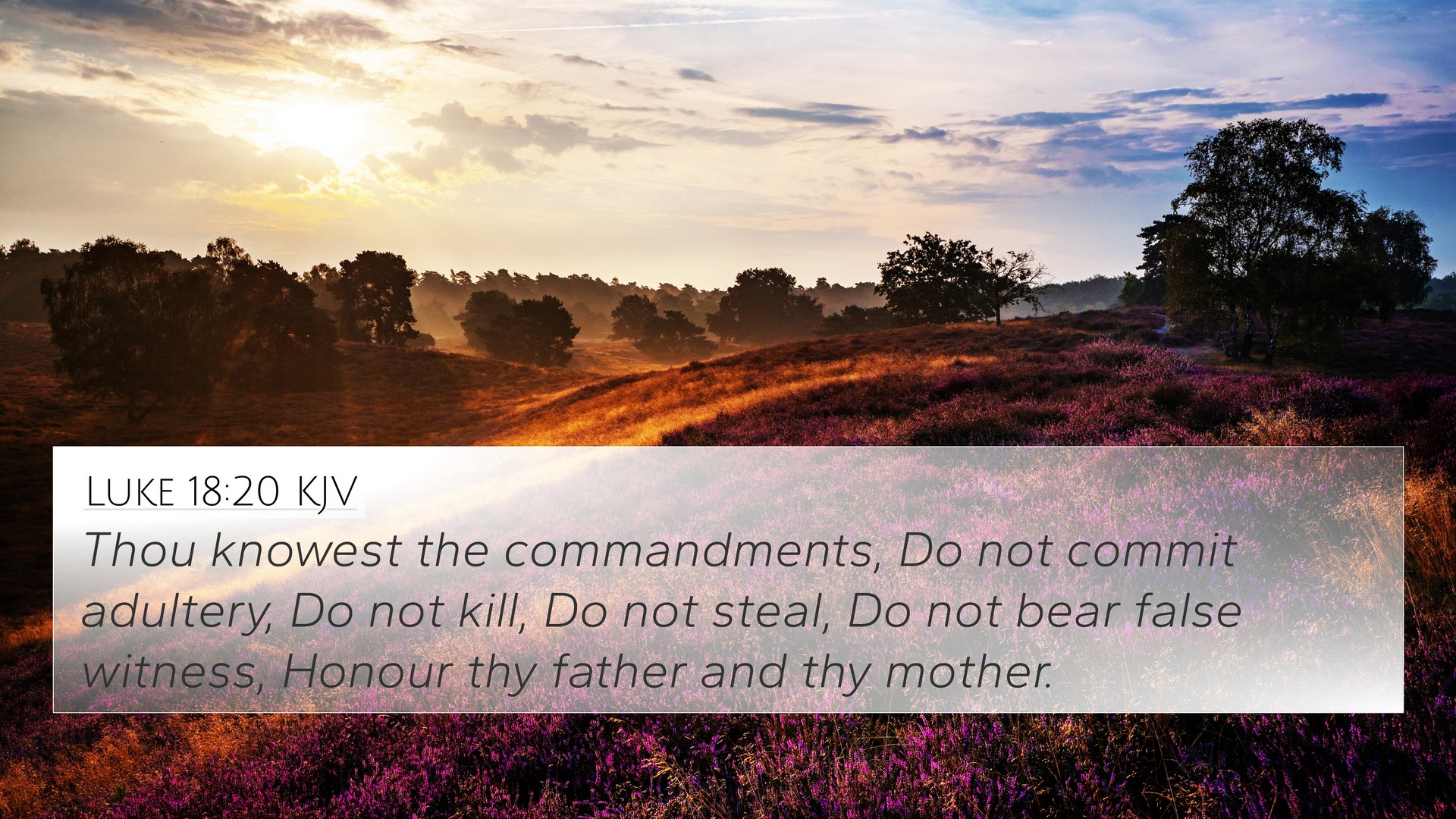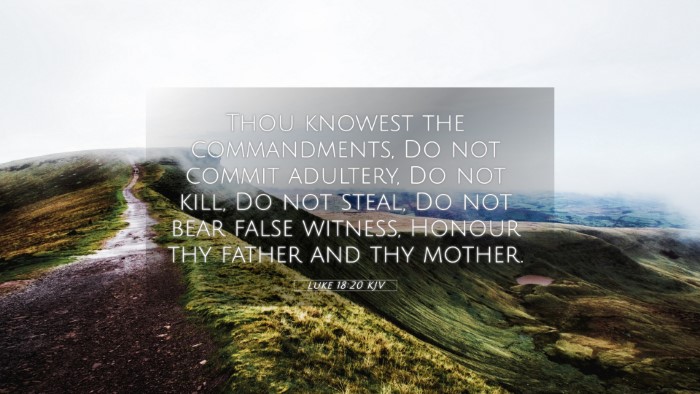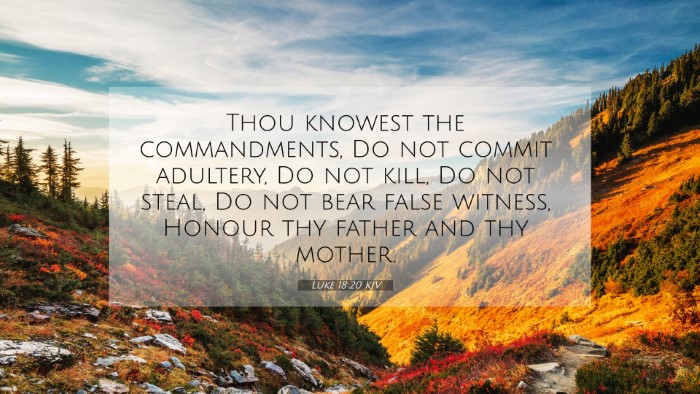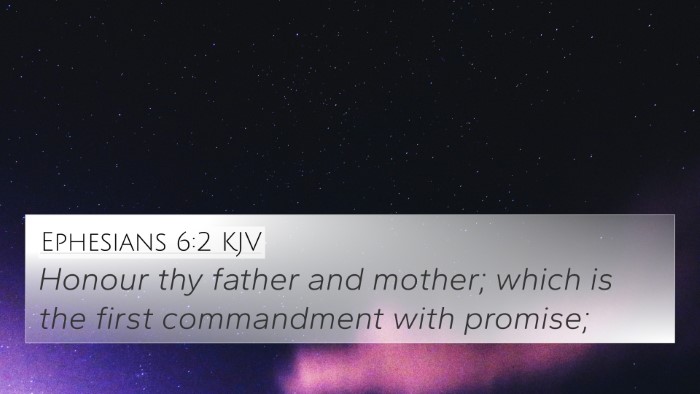Understanding Luke 18:20
Luke 18:20 states: "Thou knowest the commandments, Do not commit adultery, Do not kill, Do not steal, Do not bear false witness, Honor thy father and thy mother." This verse presents important moral directives that are instrumental in understanding the nature of God's law and human conduct.
Summary and Analysis
This verse is part of a dialogue between Jesus and a rich young ruler. The young man seeks to know what he must do to inherit eternal life. Jesus references several of the Ten Commandments, highlighting the essential moral imperatives that govern human relationships.
- Affirmation of the Law: The commandments mentioned affirm the moral law that God established, which serves as a guide for ethical living.
- Interpersonal Relationships: The focus on commands concerning others illustrates God's intention for humans to live in harmony and honesty with one another.
- The Call to Righteousness: Jesus emphasizes that adherence to these commandments is part of living a righteous life, indicating that mere acknowledgment of the law is not enough; one's life must reflect true obedience.
Commentary Insights
Drawing from the comments of noted biblical scholars:
- Matthew Henry: He highlights the importance of the moral law as a straight path to righteousness, noting that these commandments remind us of our duties towards both God and our neighbors.
- Albert Barnes: He emphasizes that these commandments are basic and universally recognized moral teachings, suggesting that Jesus used this moment to direct the young man’s attention to the essence of true goodness.
- Adam Clarke: Clarke points out that Jesus did not mention the commandment regarding covetousness, indicating that this was the young man's challenge, thus providing a subtle but profound understanding of the deep-rooted nature of sin in one’s life.
Bible Verse Cross-References
Luke 18:20 connects with various other scriptures that reinforce its themes of law, morality, and ethical living:
- Exodus 20:12-17: The original commandments as given to Moses, which detail ethical and moral obligations.
- Matthew 19:18-19: A similar account where Jesus speaks of the commandments to the rich young ruler, emphasizing their importance in the pursuit of eternal life.
- Mark 10:19: Another parallel gospel account, illustrating the consistency in Jesus' teachings across the synoptic gospels.
- Romans 13:9: Paul reiterates the significance of the commandments in guiding moral behavior, linking it with love for one’s neighbor.
- 1 John 2:4: The verse discusses knowing Him and commands, which reflects the theme of obedience to God's law.
- James 2:10: This verse highlights the necessity of following the entire law, showing the interconnectedness of the commandments.
- Galatians 5:14: Paul emphasizes that the entirety of the law is fulfilled in the commandment to love one another, linking back to the essence of Jesus' teachings.
Exploring Thematic Bible Verse Connections
Through the connections to Luke 18:20, we see the broader biblical themes of:
- Moral Integrity: The commandments serve as the foundation for a life lived righteously.
- Relationship with God: Obedience to these commandments goes hand-in-hand with one's relationship with God, as outlined in John 14:15.
- Accountability: Acknowledgment of one’s adherence to God's law brings a sense of responsibility towards personal conduct and communal living.
- Eternal Life: The pursuit of righteousness as a pathway to eternal life is a recurring theme in both the Old and New Testaments.
Tools for Bible Cross-Referencing
To dive deeper into the connections and cross-references, consider utilizing:
- Bible Concordance: A valuable resource to locate verses and themes across the Scriptures.
- Bible Cross-Reference Guide: Helpful for tracing similar themes and ideas across biblical texts.
- Cross-Reference Bible Study: Engaging in study methods that encourage exploration of related verses enhances understanding.
- Bible Chain References: Enables a study of themes in a linked format, allowing for a broader view of scriptural dialogues.
Practical Tips for Finding Cross-References
- How to find cross-references in the Bible: Utilize tools like a concordance or study Bible with cross-referencing features.
- Identifying connections between Old and New Testament: Focus on thematic parallels and specific teachings of Jesus that echo Old Testament principles.
- Comparative study of Pauline epistles: Assess recurring themes within different epistles to establish doctrinal consistency.
Conclusion
Luke 18:20 serves as a critical text that encapsulates the essence of Jesus’ teaching on obedience to God's commandments. The commandments not only guide ethical behavior but also illuminate the path to a gratifying relationship with God. By cross-referencing this verse with others, we can enrich our understanding of biblical principles, reinforcing the interconnectedness of God's word.















